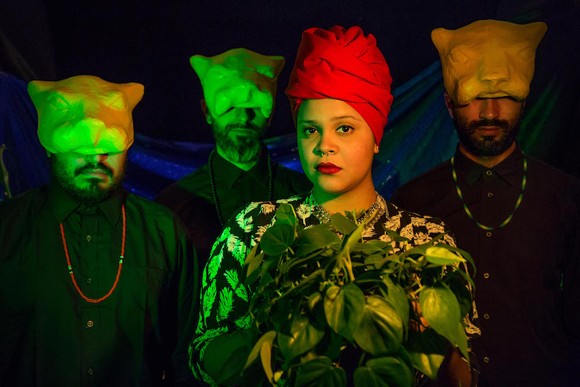Define “Left Field” cumbia, “Tropical Fruitism,” and more over an interview with Prince of Queens.
New York’s Combo Chimbita are a self-described “cumbia-not-cumbia” four-piece. Their sound is heavily indebted to the rhythms of the aforementioned Colombian dance, but, as bassist Prince of Queens tells me, the band sees their take as “left field” cumbia: “taking the essence, blending different styles, experimenting, and making it our own.” The band—which includes vocalist and guacharaca player Carolina Oliveros, drummer Dilemastronauta, and guitarist Niño Lento—cut its teeth as a collective during a residency at Brooklyn venue Barbès. Tracked live to tape, their new LP, Abya Yala, showcases their style of tight yet extroverted “tropical futurism,” with an generous energy that could only come from lifelong creative partnership and friendship.
AdHoc spoke to Prince of Queens over email ahead of Combo Chimbita’s show opening for Zula on 10/19 at the Park Church Co-op.
AdHoc: How did you all meet and start playing music together?
Prince of Queens: We have been friends and played in different groups for over six years. I met Niño Lento at a Colombian percussion workshop in Queens eight years ago. He introduced me to Dilemastronauta and later on to Carolina Oliveros. Combo Chimbita started pretty spontaneously—we started doing a residency at Barbès in Brooklyn on Monday nights, where we would just improvise and jam back to back with DJs. On most nights, the venue was empty, and Carolina would come hang out. One day she brought her guacharaca and joined us. It just happened naturally. We started narrowing down the jams and writing songs.
How did growing up in New York inform your taste in music?
I guess it’s a little different for each of us, but for me, I moved to New York when I was 15. Going to high school in Manhattan introduced me to a lot of hip-hop, which in Colombia I didn’t really listen to. There’s so much music in New York from all over the world. Growing up in Queens really brought me closer to Colombian music and cumbia, which I didn’t really pay attention to before. Eventually, I started collecting vinyl and going to second-hand stores and record shops; you can find a lot of Caribbean records here in New York! I found some Haitian records and fell in love with kompa, merengue, salsa, West African music, cumbia… music that immigrant communities have been bringing here with them for a long time and that is still very much alive.
You describe Combo Chimbita’s music as “cumbia-not-cumbia.” Could you elaborate on that?
Cumbia is so magical and universal. Depending where you come from, cumbia can sound very different, but the essence is always there. I like to think of our take as “left-field” cumbia. Taking the essence, blending different styles, experimenting, and making it our own. It’s the kind of music that’s allows for that.
You named your latest album Abya Yala, which is a title with a powerful and storied meaning behind it. Could you explain the name and what it means to you?
Abya Yala is the word used to refer to the Americas by the Kunas, a group of Indigenous people in Panama and Colombia. I like to think of words as having actual energies and a life of their own beyond the literal meaning. The word “Americas” has a very dark and negative energy, derived from colonization, slavery and the genocide of indigenous peoples. So, in a way, we are trying to reimagine where we are, where we come from, and where we are going starting by questioning what has been taught to us all our lives as unquestionable facts. We live in Abya Yala.
I love your description of Combo’s music as “tropical futurism,” which in your words is an idea “that the indigenous ideas and culture of people of color, people of Latin America, can also represent a magical and substantial future.” How does this idea affect the way you think about being a musician and performer?
I try to stay away from computers when it comes to performing, writing, or DJing. I have nothing against computers or people who use them—[they’re] great—but when it comes to creating music and my creative expression, I like to work under frameworks that limit me and allow me to develop physical and profound relations with my tools, whether it is a bass guitar, a modular synth or a tape machine. I haven’t been able to find that while working with a computer. These days, the future is often thought as this incredibly powerful net of codes and information, accessible to a lot of people, [though] few really understand it. I have no idea how it all works, and that genuinely scares me sometimes. We have so much technology, yet we live in darkness. I like to think of a future that grounds our connections to the Earth and [to] one another at the center. I try to dig deep with tools that I can understand, so I can use them to build profound connections, beyond a link.
How do you approach live shows versus recording in the studio? Do you prefer one over the other?
We actually record everything live. All together in one room, with no headphones and minimal overdubs. There isn’t much of a difference for us. There is an energy that is created in the space when we play together. Sometimes there are mistakes or cool, unexpected things. We like that a lot!
Combo Chimbita’s music blends many different styles. Who are your personal influences?
So many!!! I tend to like artists that transcend time and come from unexpected places. I love it when I hear an old record that still sounds fresh! I’ve been listening to a lot of Shleu Shleu from Haiti, lots of Gil-Scott Heron these days as well. Andres Landero’s “El Rey del Acordeón” never gets old. Los Wemblers from Peru! Chicho Ponce y los Daddy’s from México! There’s a lot of great music!

